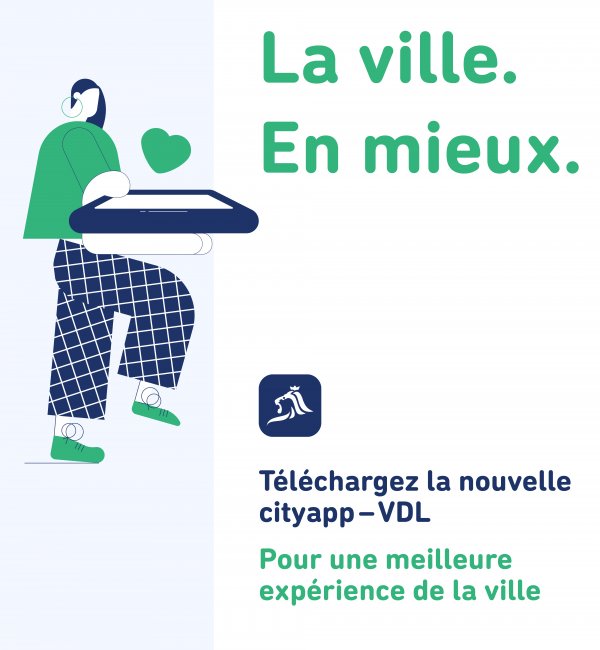Summary record
Video
emergency aid for residents of areas flooded on 14–15 July 2021
Question posed by Tom Krieps
During the spell of heavy rainfall on 14 and 15 July, some areas of the city – including the Grund and Eich – experienced severe flooding. With regard to insurance coverage, the problem arises in that the damage was caused by water flowing in from the outside, which insurers generally do not cover. Like other municipalities, does the City plan to approve an emergency assistance package to compensate victims, pending the release of state funds? It goes without saying that such emergency assistance could not supplement state compensation, but rather, would substitute for it.
Response provided by Lydie Polfer
The college of aldermen has examined the issue from all angles. Alderman Mosar will explain the conclusions reached in detail.
Response provided by Laurent Mosar
The question which Councillor Krieps raises is highly relevant, given the considerable damage caused by the flooding, which the college of aldermen witnessed for itself on the ground. Private individuals were affected, as were a number of restaurants and other businesses, some of which had to close for an expected period of two months. Apparently, some businesses – e.g. in the Stadtgrund – will not be reopening at all. After analysing the insurance benefits and state aid to which affected citizens and businesses are entitled, we concluded that it would not be reasonable for the City to offer any additional aid. Furtermore, the process for this would be difficult to manage. Unlike at the time of the COVID-19 pandemic, the City has not received any requests for aid. However, no-one will be left in the lurch: if we receive aid applications from business owners or private individuals who were severely affected by the flooding, they will be examined and given due consideration. We are currently considering subsidies for citizens and business owners who implement preventive measures to reduce the risk of flooding in their buildings.
Future of the old Luxembourg National Library (Bibliothèque nationale, formerly Athénée) building
Question posed by Cathy Fayot
In response to a parliamentary question, the government said that the old Luxembourg National Library (Bibliothèque nationale) building – i.e. the former Athénée – would be repurposed for administrative and cultural use: the upper floors, and part of the ground floor, will be occupied by various departments of the Luxembourg District Court (Tribunal d’arrondissement de Luxembourg), and part of the ground floor and the courtyards will host cultural events and establishments offering food and drink.
As the building in question sits in a magnificent setting in Ville-Haute, within the UNESCO zone, the City cannot be indifferent to its use. Thus, I would like to ask the mayor whether the City was involved in the decision to use the building for administrative purposes. Would it not have been more appropriate to consider using the building for a more lively purpose, with more human interest, by converting it into a residential complex, which would help repopulate a district that is increasingly being depopulated?
Response provided by Lydie Polfer
The City of Luxembourg was not consulted about the future use of the building, and no plans have yet been submitted to the City. However, at a meeting attended by civil servants, the City was informed that there were plans to use the upper floors to house the three chambers of the District Court, while the ground floor would be open to the public, with two restaurants and a space reserved for “cultural activities”. I will contact the Minister for Culture for further details on this matter. The idea of using it for housing was, in fact, raised a few years ago, but the building is listed and has a number of features that are worth preserving. It would have been both difficult and costly to install modern sanitary facilities, emergency exits, etc. Article D.4.1.1. of the PAP QE (Special Development Plan for Existing Districts) stipulates that in the event of a complete restoration, a major conversion, the repurposing or reconstruction of a building, or the construction of a new building, at least one half-storey or a setback floor or the equivalent of a full floor should be used for accommodation purposes […], but the mayor may, in exceptional circumstances, waive these obligations to establish facilities for the common good or in the public interest. It is obvious that the District Court is in the public interest, which means that a waiver can be granted.
parking and access for persons with reduced mobility (PMR)
Question posed by Christa Brömmel
Last week, I witnessed a commendable initiative at Luxembourg Central Station: several members of CFL's staff had taken to wheelchairs in an effort to better understand the challenges faced by persons with reduced mobility (PRMs), and to identify any accessibility issues.
Persons with reduced mobility often face challenges in public spaces: they are faced with stairs, borders and uneven surfaces; wheelchairs take up more space; moving around with a walking frame or in a wheelchair is slower; and they may feel ill at ease in large crowds. True to its motto, “Une Ville pour tous” (A City open to everyone), the City of Luxembourg – under the devoted guidance of Madeleine Kayser of the Service Intégration et Besoins spécifiques (Integration and Special Needs Department) – consistently invests a considerable amount of effort in this area.
Accessibility in the city centre is especially important, as many municipal services, doctors' offices and institutions are located there. We need to ensure that people in this demographic can get into the city centre by public transport or private car. A map of the parking spots reserved for persons with reduced mobility can be found on the City's website and also on CityApp. In the process of designating pedestrian zones, some of the parking spots reserved for persons with reduced mobility are relocated. Consequently, the persons concerned need to cover greater distances and take longer to get to their destinations.
Hence the following questions:
- How many parking spots reserved for persons with reduced mobility are there in Luxembourg City? How many are there in the city centre? Does the college of aldermen believe that this number is sufficient, or should it be increased?
- When a street is converted into a pedestrian zone, are parking spots reserved for persons with reduced mobility removed or relocated? What criteria are considered when deciding to remove or relocate these parking spots – for example, the perimeter within which the parking spot is relocated? Whose advice is sought?
- Why are parking spots reserved for persons with reduced mobility in Luxembourg City not free, while parking on the street is free for an unlimited amount of time? Does the college of aldermen have any plans to alter the fee system currently in force to bring us into line with neighbouring countries, where parking is free for persons with reduced mobility?
- How is the maximum parking time determined for parking spots reserved for persons with reduced mobility? Could the maximum parking time of 15 minutes be increased to at least 30 minutes, bearing in mind that a person with reduced mobility needs more time to get around?
- Given the challenges faced by persons with reduced mobility – especially those in wheelchairs or those who use a walking frame – when it comes to opening doors to lifts and stairwells, are all car parks equipped with automatic doors? If not, does the City plan to take steps to ensure that automatic doors are installed – at the latest when works are undertaken to increase the size of underground car parks?
- In terms of public transport, the tramway system is more accessible to persons with reduced mobility than buses, since bus drivers are not allowed to help PRMs board buses, the automatic ramps are often out of order, and the other passengers do not know how to operate the manual ramps. What measures are being considered to improve this situation so that persons with reduced mobility can use the entire public transport system?
- Could the college of aldermen consider introducing a more spacious shuttle to enable persons with reduced mobility in wheelchairs, and those using walking frames, to get from Glacis to the city centre?
- Does the City consult with the persons concerned, or their representatives – e.g. Info Handicap – on matters concerning special needs? Are the City authorities considering providing information on the issue through the Info Handicap bulletin?
Response provided by Patrick Goldschmidt
First of all, I would like to take this opportunity to thank Madeleine Kayser, whose efforts in this matter go beyond the CFL initiative that Councillor Brömmel describes. For this college of aldermen – like those that preceded us – it is of the utmost importance that Luxembourg lives up to its motto as a city that is open to everyone, including persons with special needs.
All City of Luxembourg buses are equipped with ramps that are regularly inspected. In rare cases, it may happen that a ramp does not work. Unfortunately, when this happens, the person concerned will have to wait for the next bus. If a bus driver notices that someone needs help to board the bus, they will disembark and help the person concerned. During mobility week, we ran a programme to raise public awareness of the fact that ordinary passengers can also offer to help people in this case. If Councillor Brömmel is aware of issues on specific bus lines, I invite her to share them with us.
To get from Glacis to the city centre, in addition to the ”City Shopping Bus” shuttle service, it is now possible to use the tram, which runs every four, five or six minutes, depending on the day of the week. Next spring, the City will decide whether this shuttle service – which has been used less frequently since the tram service was introduced – should be maintained.
Some car parks are not yet equipped with electrically powered doors, but it is mandatory to install such doors when renovation work is being carried out. The City's Service Ouvrages d’art (Civil Engineering Department) works closely with the Service Intégration et Besoins spécifiques (Integration and Special Needs Department), and also takes account of recommendations made by the association, ADAPTH.
There are many parking spaces reserved for persons with reduced mobility in Luxembourg City: there are 396 on-street spaces in 24 districts, 188 spaces in off-street car parks, and 47 in Park & Ride car parks.
If no parking spaces reserved for persons with reduced mobility are available near the home of a person concerned, a place will be designated, and removed if the person moves. In Ville-Haute, some parking spots reserved for persons with reduced mobility had to be removed – on account of the conversion of Rue Beaumont into a pedestrian zone, and the installation of outdoor terraces in Rue Notre-Dame – but when this occurs, we always make sure that new places are designated nearby.
Of course, persons with reduced mobility can also park in normal parking spaces. In that case, the maximum parking time will not apply and they will not be required to pay parking fees, since the nearest parking meter may be some distance away. On the other hand, when using parking spaces reserved for persons with reduced mobility, they must pay the parking fees in force in the zone in question. There are no plans to change this regulation, since buses and trams are well equipped, and free to boot.
Response from Christa Brömmel
What about the maximum parking time? Apparently, the maximum parking time for persons with reduced mobility is 15 minutes in Place des Bains.
Response provided by Lydie Polfer
In Place des Bains, there are three parking spaces reserved for persons with reduced mobility, but the parking time is not limited to 15 minutes.
Response from Christa Brömmel
Since my question dates back to 29 March, it is possible that changes have been introduced since then.
Response provided by Patrick Goldschmidt
The maximum parking time in Place des Bains is one hour. I am not aware of any areas where parking is limited to 15 minutes. If you know of any such areas, kindly let us know.
sports clubs' reactions to measures introduced to control the coronavirus pandemic
Question posed by Paul Galles
My question has to do with how sports clubs have been managing during the coronavirus pandemic. We are fortunate to have been able to maintain contact with certain sports clubs through the Commission consultative des sports et loisirs (Sports and Recreation Advisory Committee), but there are so many clubs that we have not been able to remain in contact with them all. There is a great deal going on at all of these clubs. Not only do they organise sporting activities, form teams and organise competitions; they also play an important role in youth integration and support. It is commendable that the City has maintained contact with sports clubs throughout the pandemic to help them weather the storm as best they can.
How have sports clubs responded to the crisis? Have any of them been particularly badly affected? Are there any clubs whose very existence is threatened? How can we continue to support sports clubs in the near future?
Response provided by Alderwoman Simone Beissel
The City supports at least 160 sports clubs. In 2018, the City introduced a new grants system designed to acknowledge the work that young people do in clubs. Through that system, the City has been able to award much higher grants to sports clubs.
For the system to work, the City needs to know the number of members – young and otherwise – registered at these clubs. The problem is that this information is forwarded to us on a very irregular basis. Additionally, some clubs' activities are seasonal – that is to say, they are more active during the summer or winter months. As Luxembourg is a small country, where distances are short, some of the information we need is obtained informally.
The system had only just been introduced when the pandemic first struck in 2019. During the lockdown and the months that followed, sporting activities came to a halt, and many clubs lost members.
Even when legislation was relaxed in the spring of 2021, the situation remained difficult, since training was only allowed in groups of 4, access to swimming pools was limited, etc. We still face a considerable challenge on this front.
I would like to take this opportunity to thank all the officials and volunteers in our sports clubs, who have worked long and hard throughout the pandemic to maintain their activities as best they could. Fortunately, things are now returning to a little more normality.
The fact remains that sports clubs have fewer members and that their financial position is fragile. Their activities have ground to a halt and we have yet to receive up-to-date figures through the form we circulated for that purpose. However, we do not want to leave any clubs in the lurch. This is why the college of aldermen has decided, further to a proposal made by the City's Service Sports (Sports Department), not to take current membership figures in consideration, but instead to award sports clubs grants in the same amount as in previous years.
The City has continued to maintain sports facilities during the pandemic. Since they could not be used, the grounds are in better condition today than they were before the pandemic.
We will continue to support sports clubs so that they can resume their activities fully.
early flood warning system
Question posed by Claudine Konsbruck
During the flooding that occurred on 14 and 15 July, the huge volumes of rapidly rising water took our residents completely by surprise. Since the ”Gouvalert” system failed to work as expected, most residents learnt of the situation through RTL. In addition to those areas that have regularly been affected by flooding in the past, other districts were also affected.
The question now is whether or not other arrangements should be made to warn residents in the event of flooding and other natural disasters. In other countries, some municipal authorities send text messages to residents of streets or districts where there is a risk of flooding. In France, the system is called “Alerte Citoyens”, and in Belgium, ”BE-Alert”. As such phenomena could well occur more frequently in future, it would be useful to introduce a similar system in Luxembourg.
Response provided by Lydie Polfer
That is a relevant question. However, before disseminating information on an upcoming event, one needs to know in advance that that event is going to occur. A week after the flooding, we had a meeting with the Minister of the Environment (Ministre de l’Environnement) and the Water Management Agency (Administration de la gestion de l’Eau – AGE). The AGE receives information from Meteolux, which had not anticipated such heavy rainfall. It was the first such deluge for a century, if not a millennium.
On 14 July, we were at the new stadium, to attend the first football test match, scheduled for that evening. As rain had been forecast, the head of the Service Sports (Sports Department), at my request, contacted a weather service to check whether the match could go ahead as planned. They were told that the rain would not be a problem. From 20:00 to 22:00, we were all at the stadium – fire services, the Police, etc. It was raining a little at the time, but not enough to cause concern. On returning home, at around 23:20, I was informed of the flooding by the fire services. No-one had expected such heavy rainfall.
As regards arrangements to inform the public, the system which Councillor Konsbruck describes is best. According to the information I have at my disposal, the government is currently working with POST on such a system, designed to send text messages to residents who could be affected. The City of Luxembourg is prepared in that we plan to extend the list of services provided through our ”City App”, offering residents the option to sign up to receive such alerts. From a technical point of view, introducing this additional feature will not be a problem.
Although it has been generally acknowledged that the government's “Gouvalert” app failed to work satisfactorily, we should welcome the fact that work is under way to correct this. We will stay abreast of progress to ensure that messages are sent to residents in as timely a fashion as possible. Of course, the media also has a very important part to play in such circumstances.









